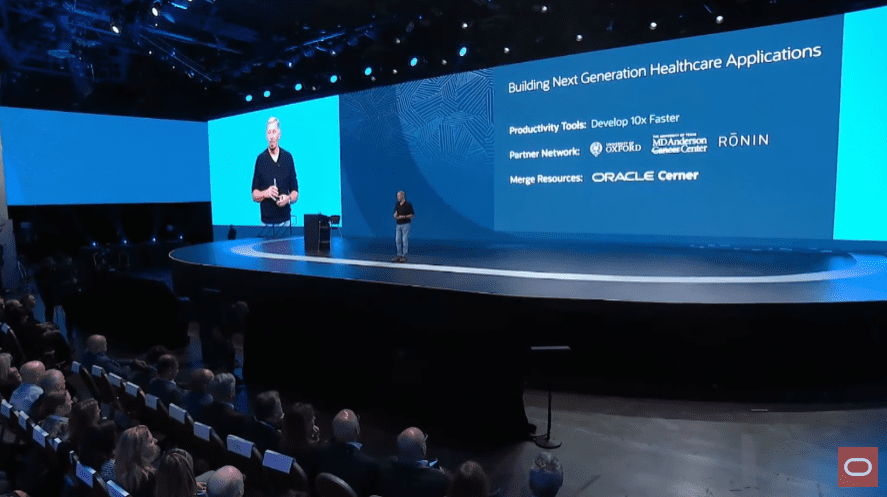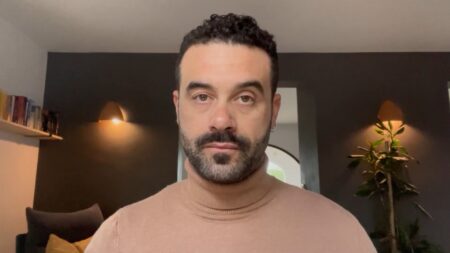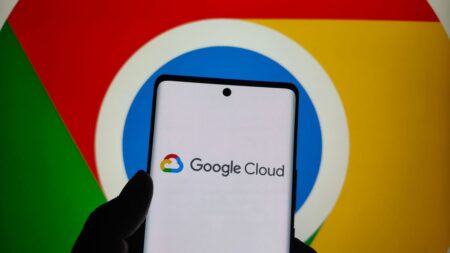
Offering an impassioned vision for improving the lives of every person on the planet, Oracle founder Larry Ellison laid out a sweeping plan to overhaul the global healthcare system in what will surely be the biggest initiative Oracle — or perhaps any tech vendor — has ever undertaken.
Repeatedly emphasizing that Oracle’s one of many players in a large and growing global coalition, Ellison reflected a new facet of the company he founded 45 years ago: an open eagerness to work with other organizations — researchers, governments, healthcare providers, pharmaceutical companies, and even other tech vendors — in this lofty pursuit.
Ellison devoted about 60 minutes of his 75-minute keynote at Oracle CloudWorld to this global healthcare vision, and not once in that entire hour did he even mention — let alone disparage — any of Oracle’s competitors, a practice that over the years had become an indispensable element of his keynotes.
In fact, Ellison closed with this gracious note: “We’re absolutely committed to this mission and have a lot of help from a lot of partners who are just as committed as we are.”
I’ll get into the details of this massive Oracle healthcare initiative in a future piece, but today’s piece is focusing on how this particular vision of and for Oracle is reshaping the company.
So, on that matter, a few questions:
- Has Larry Ellison mellowed?
- Has the guy who’s roiled the database world for four decades decided to go for a participation trophy?
- Has the rebel who reshaped the enterprise-applications business lost his edge?
- Has the hypercompetitive athlete and sports-industry disruptor who revolutionized the America’s Cup and professional tennis decided that winning isn’t all it’s cracked up to be?
The answers are:
- No.
- Heck no.
- Hell no.
- Not in this lifetime.
But where Larry Ellison has changed — quite dramatically — is in his open and unconditional embrace of working with partners of all types to achieve goals that exceed the capabilities of Oracle alone. During the healthcare portion of his CloudWorld keynote, Ellison mentioned that specific point a number of times. Here’s an example from early in his presentation:
“What we are trying to do is very ambitious — it’s never been done before. Can it be done? If so, how?
“Well, we know for certain that we can’t use the same tools that were used in previous generations—they just won’t work. And we know we need to do all this in a reasonable timeframe and at a reasonable cost, and the system must have world-class cybersecurity, it can never go down—great resilience—and it must be easy to use,” Ellison said.
“We’ll need to develop software 10X faster than ever before. We learned this during the pandemic when we saw we had to build much faster than ever before.
“At the same time, we also realize that we can’t do this by ourselves—we have to have great partners as we automate the entire healthcare ecosystem. Here are a few of them: the University of Oxford, the CDC, MD Anderson, AI specialists like Ronin, and other partners. So we had to create a totally open development platform so they could have access to it.”
And the “last key to unlock the door of possibility,” Ellison said, was the acquisition of Cerner, resulting in a powerful combination of Oracle technology with Cerner domain expertise.
“So we now have more resources we can apply, and we have the right types of experience, and we’re now united in a joint mission to take Cerner’s healthcare knowledge and Oracle’s technology knowledge and merge them together to tackle the next generation of healthcare systems.”
The other major element of Ellison’s mission is to make that a truly global system, rather than just focusing on highly developed countries.
“After the vaccine was created, it had to be distributed, and we worked with the CDC to distribute it based on gathering patient data, with all of that being a totally voluntary process for the patients,” Ellison said.
“There was an incredible sense of urgency around this, and it was first used in Ghana to distribute the yellow fever vaccine. And we picked Ghana because, for this global system to work properly, it can’t just run in major cities in major hospitals with incredible teams of specialists. We can’t accept that it might not work so well in rural Wyoming or Montana or the Ivory Coast or Ghana,” he said.
“If we can make this work in Ghana first, then it should be okay in Los Angeles.”
Nothing short of a fully global system will be sufficient, Ellison said.
“It has to be distributed globally: in India, South Africa, Asia, and every country around the globe. Because we don’t know where the next outbreak will come from — and so we must have a global system.” As an example, Ellison said that COVID-19 traveled from Wuhan to Milan to New York, which he said are each capitals of the global fashion industry.
So, the solutions being created by Oracle and its partners will become “an early-warning system” that will allow countries around the world to identify and isolate outbreaks before they turn into pandemics.
“We can’t possibly do all of this ourselves, so have to build a platform — a totally open and highly secure platform — where others can plug in and innovate.
“And then we can all work together to make all of this happen,” Ellison said.
“But it has to be a joint mission.”
Want to gain more insights from Bob Evans and view cloud-focused content from Cloud Wars Expo? On-demand video from the event is rolling out now, with more than 40 hours of cloud education content — featuring 100-plus speakers — to be made available in the coming days. All content is free to Acceleration Economy subscribers with an on-demand pass.









